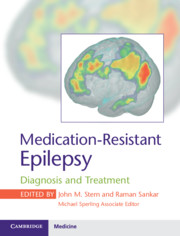Book contents
- Medication-Resistant Epilepsy
- Medication-Resistant Epilepsy
- Copyright page
- Dedication
- Contents
- Contributors
- Chapter 1 The Natural History of Epilepsy
- Chapter 2 Challenges in Identifying Medication-Resistant Epilepsy
- Chapter 3 International League Against Epilepsy’s Definition of Medication-Resistant Epilepsy
- Chapter 4 The Economic Impact of Medication-Resistant Epilepsy
- Chapter 5 Social Consequences of Medication-Resistant Epilepsy
- Chapter 6 Mortality and Morbidity of Medication-Resistant Epilepsy
- Chapter 7 Models for Medication-Resistant Epilepsy
- Chapter 8 Neurobiology of Medication-Resistant Epilepsy
- Chapter 9 Genetic Causes of Medication-Resistant Epilepsy
- Chapter 10 Malformations of Cortical Development as Causes of Medication-Resistant Epilepsy
- Chapter 11 Hippocampal Sclerosis as a Cause of Medication-Resistant Epilepsy
- Chapter 12 Autoimmune Causes of Medication-Resistant Epilepsy
- Chapter 13 Medication-Resistant Epilepsy Syndromes in Children
- Chapter 14 Medication-Resistant Epilepsy in Adults
- Chapter 15 Approach to the Treatment of Medication-Resistant Epilepsy
- Chapter 16 Pharmacotherapy for Medication-Resistant Epilepsy
- Chapter 17 Reproductive Health for Women with Medication-Resistant Epilepsy
- Chapter 18 Resective Surgery for Medication-Resistant Epilepsy
- Chapter 19 Ablative Surgery for Medication-Resistant Epilepsy
- Chapter 20 Stimulation Treatment for Medication-Resistant Epilepsy
- Chapter 21 Diet Therapy for Medication-Resistant Epilepsy
- Chapter 22 Botanical Treatments for Medication-Resistant Epilepsy
- Chapter 23 Psychiatric Comorbidities in Medication-Resistant Epilepsy
- Index
- References
Chapter 21 - Diet Therapy for Medication-Resistant Epilepsy
Published online by Cambridge University Press: 20 August 2020
- Medication-Resistant Epilepsy
- Medication-Resistant Epilepsy
- Copyright page
- Dedication
- Contents
- Contributors
- Chapter 1 The Natural History of Epilepsy
- Chapter 2 Challenges in Identifying Medication-Resistant Epilepsy
- Chapter 3 International League Against Epilepsy’s Definition of Medication-Resistant Epilepsy
- Chapter 4 The Economic Impact of Medication-Resistant Epilepsy
- Chapter 5 Social Consequences of Medication-Resistant Epilepsy
- Chapter 6 Mortality and Morbidity of Medication-Resistant Epilepsy
- Chapter 7 Models for Medication-Resistant Epilepsy
- Chapter 8 Neurobiology of Medication-Resistant Epilepsy
- Chapter 9 Genetic Causes of Medication-Resistant Epilepsy
- Chapter 10 Malformations of Cortical Development as Causes of Medication-Resistant Epilepsy
- Chapter 11 Hippocampal Sclerosis as a Cause of Medication-Resistant Epilepsy
- Chapter 12 Autoimmune Causes of Medication-Resistant Epilepsy
- Chapter 13 Medication-Resistant Epilepsy Syndromes in Children
- Chapter 14 Medication-Resistant Epilepsy in Adults
- Chapter 15 Approach to the Treatment of Medication-Resistant Epilepsy
- Chapter 16 Pharmacotherapy for Medication-Resistant Epilepsy
- Chapter 17 Reproductive Health for Women with Medication-Resistant Epilepsy
- Chapter 18 Resective Surgery for Medication-Resistant Epilepsy
- Chapter 19 Ablative Surgery for Medication-Resistant Epilepsy
- Chapter 20 Stimulation Treatment for Medication-Resistant Epilepsy
- Chapter 21 Diet Therapy for Medication-Resistant Epilepsy
- Chapter 22 Botanical Treatments for Medication-Resistant Epilepsy
- Chapter 23 Psychiatric Comorbidities in Medication-Resistant Epilepsy
- Index
- References
Summary
Although pharmacologic therapy remains the mainstay of treatment for most types of epilepsy, today the use of dietary therapy, most notably the ketogenic diet (KD), has become increasingly recognized as helpful, especially in those patients whose seizures are resistant to traditional anti-seizure medications. The history of using dietary manipulation for seizures dates back to the time of The Bible [1]. There are descriptions of Jesus curing ‘possessed’ patients with prayer and fasting [2,3].
- Type
- Chapter
- Information
- Medication-Resistant EpilepsyDiagnosis and Treatment, pp. 241 - 247Publisher: Cambridge University PressPrint publication year: 2020



